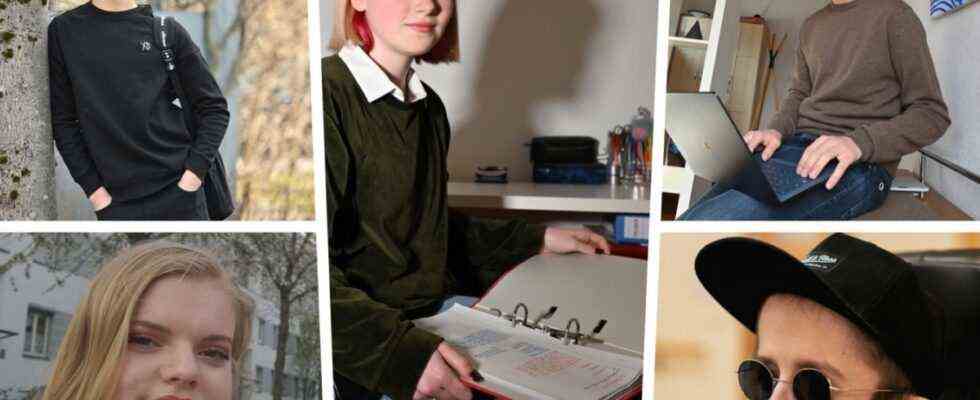You had imagined it differently, of course. And yet they are happy that the study for graduation, that the school days are now behind them. Done: no more obligations, freedom, summer. Lilli Schickel has her high school diploma and will be able to study elementary school teaching with special education from autumn. Bara Chayah has achieved the average grade that he needs to switch to the FOS. Niklas Krofta received his Abitur certificate on Friday, grade: 1.1. Yannick Andricek graduated from high school, Maya Grombach wrote her last exam on Wednesday. The way there was more difficult for this year than for others.
The last school year before graduation is about learning, exams and grades. But it’s also about graduation parties, graduation trips and future plans. And all of that was and is in this school year, which is now ending, completely different than usual. A school leaving certificate in Corona times – how to do it, what difficulties the high school students had to deal with, what moves them and what they are worried about about all of this five pupils from the different types of school have been writing regularly from their very personal perspective since mid-February.
There are five young people from more than 15,800 high school students across the city. 4,100 at the grammar schools, 4,200 at the FOS and BOS, 3,100 at the Realschulen, 2,300 middle school students and a further 800 middle school students in the M-Zug, for the middle school leaving certificate, 750 at the special schools, 520 at the business schools – so many have after this Corona- Passed their final exam. Not all results have been finalized yet. The Abitur exams had already started in mid-May, and it is already clear that this Abitur was similar to the years before. The average of 2.14 is actually the best Bavarian high school diploma ever. And yet: Corona made a difference.
Driving away with the whole senior class, that won’t work because of Corona, says Maya Grombach, who is doing her secondary school leaving certificate at the Theresia-Gerhardinger-Girls’ Realschule. She hopes that she can go away with at least four friends. “But I’m really looking forward to it when it’s over, when I have a certain amount of freedom, with my degree in my pocket,” she says. And she adds: “This year is just dragging on for so long.”
Rapid tests quickly became the norm for high school students
It was difficult for her that there was no routine for many months. “Normally you go to school and then you start learning everyday,” says Maya Grombach. “But if everything changes again and again, it gets you into trouble. Especially when you have to find the strength to sit down and say: I’m doing something now, I’ll take part in class, I work well.” If you work at home alone, it is much easier to get distracted.
School lessons in front of the screen, separate classes, lessons in the auditorium, the gym and the cafeteria – that changes a lot. Yannick Andricek says that he has noticed that classroom teaching cannot be replaced. His teachers at the FOS on Barlachstrasse really tried very hard, but the exchange with the other students is simply missing if you only see each other through cameras. “Discussions tend to be difficult, you have to concentrate a lot more.” Yannick Andricek has vitreous bone disease, as it is called colloquially. After graduation, he now wants to relax and think about what his future should look like. He wants to do something with media and film, that’s for sure.
Hardly any other topic was discussed and argued as extensively this school year as the self-tests in the classroom. They quickly became the norm for high school students. “I put the stick in my nose, turn it, dip it into the liquid and then I drop the liquid into the test cassette. The rest of the test is done by itself,” says Bara Chayah, who works at Toni-Pfülf Middle School -Straße graduated from high school. Test twice a week, three times a week – the main thing is that the lessons can take place.
Keeping your distance, also from your classmates – the youngsters have got used to that. Have to get used to. For months, Bara Chayah had lessons in the auditorium with the other high school students in his class – 20 teenagers in a room that could fit 200 people. They moved back to the classroom in mid-June. At first it felt pretty tight and small, he says. And suddenly having someone sitting right next to you again – that was a little strange for everyone at first.
About the discomfort in crowded subways, the frustration about canceled carnival holidays and poor school WiFi – the high school students wrote about all these topics. Lilli Schickel from the FOS on Barlachstrasse was annoyed that only the high school graduates are spoken of, not those at the FOS. And about the fact that, despite the tests, she had to wear a mask during the high school exams. In her case, that was nine hours during the written German test.
That this school year was not only bad, that it also had advantages, is what high school graduate Niklas Krofta from Klenze-Gymnasium described in his column. He even found the lockdown in winter pleasant – he’s someone who likes to spend time at home, he says. But: “In the end it was good to be able to go back to school. Because now it is inevitably over.” He wants to start studying computer science at the TU in the fall. And hopes that the courses will then take place at the university. Not at home on the computer.

